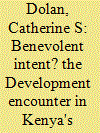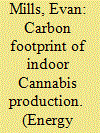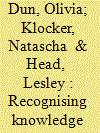| Srl | Item |
| 1 |
ID:
069116


|
|
|
| 2 |
ID:
112888


|
|
|
|
|
| Publication |
2012.
|
| Summary/Abstract |
The emergent industry of indoor Cannabis production - legal in some jurisdictions and illicit in others - utilizes highly energy intensive processes to control environmental conditions during cultivation. This article estimates the energy consumption for this practice in the United States at 1% of national electricity use, or $6 billion each year. One average kilogram of final product is associated with 4600 kg of carbon dioxide emissions to the atmosphere, or that of 3 million average U.S. cars when aggregated across all national production. The practice of indoor cultivation is driven by criminalization, pursuit of security, pest and disease management, and the desire for greater process control and yields. Energy analysts and policymakers have not previously addressed this use of energy. The unchecked growth of electricity demand in this sector confounds energy forecasts and obscures savings from energy efficiency programs and policies. While criminalization has contributed to the substantial energy intensity, legalization would not change the situation materially without ancillary efforts to manage energy use, provide consumer information via labeling, and other measures. Were product prices to fall as a result of legalization, indoor production using current practices could rapidly become non-viable.
|
|
|
|
|
|
|
|
|
|
|
|
|
|
|
|
| 3 |
ID:
163232


|
|
|
|
|
| Summary/Abstract |
This article explores knowledge transfers in international migration and development through insights from Pacific Island seasonal workers participating in Australia's Seasonal Worker Programme (SWP). We discuss actual and potential horticultural knowledge transfers that are enabled when circular migrants are engaged in agriculture in their place of migration origin and destination. Transfers identified by seasonal workers themselves include: technologies to improve horticultural production, exposure to different crop types, and techniques to improve crop yields. We argue that SWP migrants should be reframed as knowledge holders (not ‘unskilled’ or ‘low‐skilled’ labourers), and reflect on how knowledge transfers can be better supported to enable benefits for communities of origin and destination.
|
|
|
|
|
|
|
|
|
|
|
|
|
|
|
|